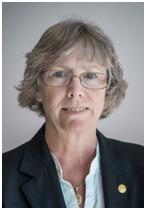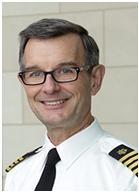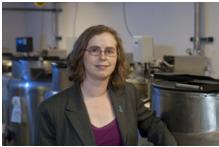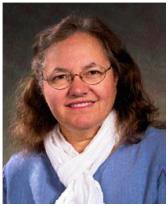SCIENTIFIC ADVISORY COMMITTEE (SAC)
Scientific Advisory Committee Chair

Professor of Data Science for Health
Institute of Health and Society,
University of Newcastle,
United Kingdom
He leads the international DataSHIELD project (EU FP7, MRC, WT) which provides a novel approach to secure utilisation of data based on parallelized mathematical modelling and distributed computing. He is PI of 58-READIE (MRC and WT) that maintains and enhances the infrastructural platform underpinning data and biosample release from the Biomedical Resource of the 1958 Birth Cohort and is lead of the technical group METADAC (MRC, ESRC, WT) that now oversees access to the biomedical components of 1958, 1970 and Millennium Cohorts and Understanding Society. He is co-PI (leading on infrastructural development) of ALSPAC (the Avon Longitudinal Study of Parents and Children, also MRC and WT). He sits on the Expert Advisory Group on Data Access (WT, MRC, ESRC, CRUK) and chairs the Scientific Advisory Committee of Alberta’s Tomorrow Project, and the International Steering Committee of P3G (the Montreal-based Public Population Project in Genomics in Society).
Scientific Advisory Committee Member

Canada Research Chair in Law and Medicine
Faculty of Medicine, Department of Human Genetics, McGill University
Professor Knoppers was the former Chair of the International Ethics committee of the Human Genome Organization (HUGO) (1996-2004), and member of the International Bioethics Committee of the United Nations Educational, Scientific and Cultural Organization (UNESCO) which drafted the Universal Declaration on the Human Genome and Human Rights (1993-1997). Co-Founder of the International Institute of Research in Ethics and Biomedicine (IIREB) (2000 – 2009), she founded the Population Project in Genomics (P3G) and CARTaGENE in 2003. From 2000-2006 she served on the Board of Genome Canada, became Chair of the Ethics Working Party of the International Stem Cell Forum, Co-Chair of the Sampling/ELSI Committee of the 1000 Genomes Project (2007-) and a member of the Scientific Steering Committee of the International Cancer Genome Consortium (ICGC) (2009-). In 2013, she became Chair of the Regulatory and Ethics Working Group and Member of the Steering Committee (TSC) of the Global Alliance for Genomics and Health.
Professor Knoppers received a Doctor of Laws Honoris Causa from the University of Waterloo (2001), a Doctor of Medicine Honoris Causa from Université de Paris V (René Descartes) (2002), a Doctor of Laws Honoris Causa from McMaster University, Ontario (2007) and a Doctor of Laws Honoris Causa from the University of Alberta in 2008. In 2002, she was elected Fellow of the American Association for the Advancement of Science, selected as one of the 50 Nation Builders in Canada by the Globe and Mail, and named Officer of the Order of Canada. In that same year, she was elected Fellow of The Hastings Center (Bioethics), New York, member of the International Ethics Committee of the World Anti-Doping Agency and in April 2005, Fellow of the Canadian Academy of Health Sciences (CAHS). She was elected Governor of the Quebec Bar in 2006 and in 2007 was elected Advocatus Emeritus. In 2011, she received the ACFAS Prix Jacques Rousseau for interdisciplinarity. In April 2012 she was name Officer of the Ordre national du Quebec and in June received an award “Prix Montreal In Vivo: Secteur des sciences de la vie et des technologies de la santé”. In 2013, she was named “Champion of Genetics” by the Canadian Gene Cure Foundation. In 2014, she was named “Great Montrealer”, Scientific Sector, Board of Trade of Metropolitan Montreal.
Scientific Advisory Committee Member

Research Professor of Psychology at the University of Southern California
Pedersen has over 520 peer-reviewed publications in scientific journals and has been supported by funds from the NIH since the 1980’s (NIA, NIEHS, NIDDK, NINDS). She has mentored 22 PhD students and 15 postdocs.
Through Nancy Pedersen’s efforts, the Swedish Twin Registry has been rejuvenated and expanded to include essentially all twins born in Sweden since 1886 and with prospective information that has and will continue to be a foundation for numerous research efforts in the field of genetic epidemiology. She is now the Scientific Director of LifeGene, a prospective cohort study that will collect phenotype, exposure, and biobanking materials on 250,000 Swedes.
Scientific Advisory Committee Member

Although her expertise is primarily in qualitative methods, such as ethnography, she collaborates with colleagues who bring diverse quantitative methods to the team, so that they are able to explore how social factors such as policies, commercialization of food, and the built environment of communities where people live may invisibly structure people’s choices.
With knowledge of how social forces may be shaping the health of people and communities, her current research priorities are on intervening on the social conditions contributing to obesity and chronic diseases. Her contribution to intervention development and evaluation includes conducting large-scale, community-based and population policy-level health promotion initiatives to address chronic disease prevention.
Her philosophy has always been to make the healthy choice the easy choice, and this can best be accomplished if stakeholders are made aware of the relationships demonstrated through research initiatives and stimulated to act on them. Therefore, a priority of all of her research endeavours is an integration of practitioners and policy decision-makers into the research/ intervention team to facilitate rapid action.
Degrees
PhD, Dalhousie University, 1993
MA, Mount Saint Vincent University, 1988
RD, Victoria General Hospital, 1983
Awards
Fellow of the Canadian Academy of Health Sciences (FCAHS), 2012
Applied Public Health Chair, Canadian Institutes of Health Research / Heart and Stroke Foundation of Canada, 2008 – 2013
Health Senior Scholar, Alberta Heritage Foundation for Medical Research, 2005 – 2010
Health Scholar, Alberta Heritage Foundation for Medical Research, 2000 – 2004
Scientific Advisory Committee Member

Professor, Departments of Oncology, Biochemistry, Molecular Biology, University of Calgary
Scientific Advisory Committee Member

US National Cancer Institute
In 1993, Dr. Troiano entered government service and the Commissioned Corps of the US Public Health Service as an Epidemic Intelligence Service Officer with the Centers for Disease Control and Prevention (CDC). He joined the Division of Health Examination Statistics of the CDC’s National Center for Health Statistics, where he helped design the body composition, physical activity and physical fitness components of the National Health and Nutrition Examination Survey (NHANES). Since moving to the NCI, Dr. Troiano has extended his work with the NHANES by implementing the use of devices to obtain measures of participants’ physical activity, sleep, and body strength. Captain Troiano is the author of more than 70 publications and has been a member of the Interagency Work Group for the Healthy People 2010 and 2020 Nutrition and Overweight Focus Area and the Healthy People 2020 Physical Activity and Fitness Focus Area. During an earlier detail to the Office of Disease Prevention and Health Promotion, Dr. Troiano was the Coordinator of the US Department of Health and Human Services (HHS) development of 2008 Physical Activity Guidelines for Americans.
Scientific Advisory Committee Member

Associate Professor of Medicine, Harvard Medical School
A common thread in her research is a strong interest in optimal integration of biologic markers into epidemiologic studies through her role as Director of the BWH/Harvard Cohorts Biorepository. This core (annual budget ~$1.5 million) maintains the scientific integrity of and uses nearly two million biospecimens from over 120,000 NHS/NHSII women. Her primary responsibilities include assisting investigators with the scientific aspects of incorporating biomarkers into their studies, managing laboratory and data management personnel, overseeing new sample collections, and investigating new technologies.
SCIENTIFIC STEERING COMMITTEE (SSC)
Scientific Steering Committee Member

Clinical Associate Professor, Departments of Pathology and Laboratory Medicine, Pediatrics, and Community Health Sciences
Cumming School of Medicine, University of Calgary
Scientific Steering Committee Member

In addition, she serves as coordinator of data harmonization for the BioSHaRE (Biobank Standardisation and Harmonisation for Research Excellence in the European Union) project. This large scale FP7-funded project aims to ensure the development of harmonized measures and computing infrastructures enabling the effective pooling of data across large European cohorts studies including UK Biobank, Lifelines, KORA, Nord-Trøndelag Health Study, LifeGene, Estonian Genome Center, National Child Development Study, and National FINRISK Study. Dr Fortier also led the construction of the P3G (Public Population Project in Genomics) Observatory, a central internet repository of scientific resources and tools. Finally, at the Canadian level, Dr Fortier has been involved in the development and harmonization of a number of cohorts including the Canadian Longitudinal Study on Aging (50 000 participants), CARTaGENE (20 000 participants) and Canadian Partnership for Tomorrow Project (300 000 participants).
Scientific Steering Committee Member

AI-HS Health Senior Scholar
Adjunct Professor and ACF Weekend to End Women’s Cancers Breast Cancer Chair
Departments of Oncology, Community Health Sciences
Faculty of Medicine and Faculty of Kinesiology
University of Calgary
Dr. Friedenreich has conducted three population-based case-control studies of lifetime physical activity and cancers of the breast, prostate and endometrium that have used a new questionnaire that she developed, tested and published entitled the Lifetime Total Physical Activity Questionnaire. She and her colleagues found statistically significant reductions in risk of breast, prostate and endometrial cancers. Cohort follow-ups for each of the case groups have also been conducted: thus far they have found that recreational activity significantly improved survival after breast and prostate cancer. The endometrial cancer cohort study is on-going.
Dr. Friedenreich led the first intervention trial of exercise for breast cancer prevention in Canada, the ALPHA Trial (Alberta Physical Activity and Breast Cancer Prevention Trial). She and her colleagues found that the exercise intervention reduces endogenous estrogens, decreased insulin resistance, adiposity and inflammation, but had no effect on mammographic density. Dr. Friedenreich is now conducting the Breast Cancer and Exercise Trial in Alberta (BETA Trial) that has randomized 400 postmenopausal, healthy, inactive women into a year-long exercise intervention of either 150 or 300 mins/wk of aerobic exercise to determine what level of activity is optimal to impact breast cancer biomarkers.
Dr. Friedenreich is also involved in numerous randomized controlled exercise intervention trials among cancer patients aimed at understanding how exercise may improve well-being, coping, rehabilitation and survival after cancer. She and her colleagues are currently conducting a population-based cohort study of physical activity, health-related fitness and breast cancer survival known as the Alberta Moving Beyond Breast Cancer Cohort Study (AMBER study) in 1500 incident breast cancer cases in Alberta. Dr. Friedenreich is also a co-investigator on the first ever randomized controlled trial of exercise for colon cancer survival being conducted across Canada and Australia known as the Colon Health and Lifelong Exercise Trial (CHALLENGE Trial).
The ultimate objective of Dr. Friedenreich’s research program is to provide evidence for improved public health guidelines regarding the exact type, dose and timing of physical activity that is of greatest benefit for reducing cancer risk and improving prognosis and survival after cancer. Her research program has been very active and well-funded with collaborations worldwide for increasingly complex population health research in cancer focused on lifestyle risk factors.
Scientific Steering Committee Member

Chair, Alliance for Canadian Health Outcomes Research in Diabetes (ACHORD)
Apart from his primary interests in diabetes health outcomes, Jeff collaborates with other colleagues in areas such as dialysis, osteoporosis, stroke and cardiology, often providing support in the assessment of patient-reported outcomes in these chronic medical conditions. As a pharmacist, Jeff is also interested generally in pharmaceutical policy and the formulary decision-making process.
Jeff received a B.S.P. with Distinction in 1988 and a M.Sc. in clinical pharmacy/pharmacoepidemiology in 1994, both from the University of Saskatchewan in Saskatoon, Canada. He received his Ph.D. in Pharmaceutical Sciences from The University of Arizona in 1996, majoring in pharmaceutical economics.
Scientific Steering Committee Member

She also has longstanding interests in food access among marginalized populations, with a particular focus on research aimed at informing policy and program interventions to reduce food insecurity. Work in this area focuses on a broad range of potential factors that might influence food security, including social policy, housing, and neighbourhood characteristics.
In addition, Dr. Kirkpatrick has interests in food policy, dietary guidance, and food environments, and is a registered dietitian.
Scientific Steering Committee Member

Cancer Epidemiology and Prevention Research
Cancer Care Alberta, Alberta Health Services
Adjunct Associate Professor, Departments of Oncology, and Mathematics and Statistics, University of Calgary
• developing methods for estimating the impact of screening interventions on genetic and disease risks in members of families who segregate a major gene;
• extending methods for incomplete life history data and multi-state models to correlated data settings and with application to complex diseases;
• combining metabolomic data collected from disparate platforms by developing new methods that also reduce the measurement error and co-variation effects; and
• imputing censored values below the limit of detection to improve accuracy in biomarker identification.
Scientific Steering Committee Member

Cumming School of Medicine, University of Calgary
Her research program focuses on improving health and well-being of women during pregnancy to achieve optimal maternal, birth and early childhood outcomes. Suzanne is the Principal Investigator of the All Our Babies Study, a cohort with 3,200 mother-child pairs that is investigating the impact of genetic and environmental factors on maternal-child health. The underlying aim of her research program is to optimize birth and childhood outcomes by creating evidence that informs the development of community and clinical programs and influences policy.
